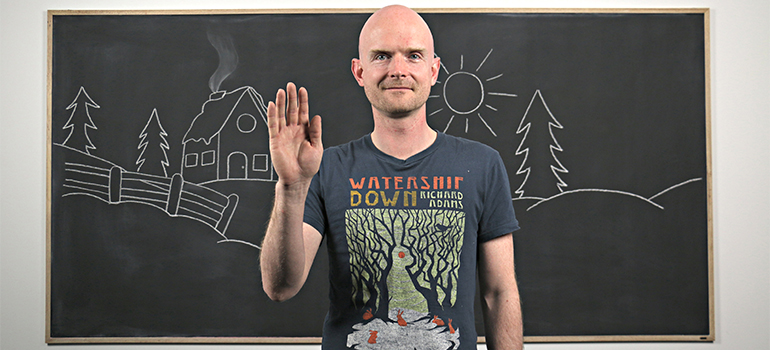

Steven believes the eclectic use of different mediums allows an opportunity to create an open atmosphere for his students.
A UBC psychology instructor is taking a creative approach to teaching – through the use of stop-motion animation.
Steven Barnes, an instructor in the department of psychology, has employed art and interactivity in his work for several years. His methods range from the use of stop-motion ‘chalkboard’ animation in his classes, to allowing students to offset poor grades through optional projects that invite them to explore mediums beyond the traditional.
“I have a Post Doc in Interactive Arts,” he explains. “When I started as a sessional instructor at UBC, it seemed natural to incorporate this into my teaching. I encourage my students to look beyond traditional forms of expressing their knowledge. For example, as part of my ‘Brain and Behaviour’ class, a student created a graphic novel.”
In addition to being an instructor, Steven is Assistant Head of Undergraduate Affairs within his department. He has spent the last three years teaching at Vantage College and was recently awarded a UBC Killam Teaching Prize. Off campus, Steven is an associate member of Gallery Gachet in the Downtown Eastside. The gallery uses art to demystify and challenge issues related to mental health and social marginalization.
He continues: “Gallery Gachet provides a space for artists who have experienced mental health and trauma issues. I am also involved in CREST.BD which is dedicated to collaborative research and knowledge exchange in bipolar disorder. There are clear links between bipolar disorder and instances of creativity.”
Steven believes the eclectic use of different mediums allows an opportunity to create an open atmosphere for his students. His passion for art, teaching and mental health are clear in his work – and the time he takes to prepare his animations.
“The process of stop-motion animation is very time consuming,” he explains. “Slowly over the years I have learned to delegate. For example, I now collaborate with UBC undergraduate students: I draw the visuals and they then trace them to create the animation.”
With continued advances in technology, and accessible platforms, will Steven fall prey to the pressure to use new mediums as they become available?
“I admit that it’s great to enable interactivity through these mediums,” he says. “But there is still something very compelling about a good, traditional lecture. As an instructor, there is power in simply being a strong storyteller.”
For more information about Steven’s work, visit stevenjbarnes.com or check out his YouTube channel.
This post was originally featured on the Working at UBC website.


